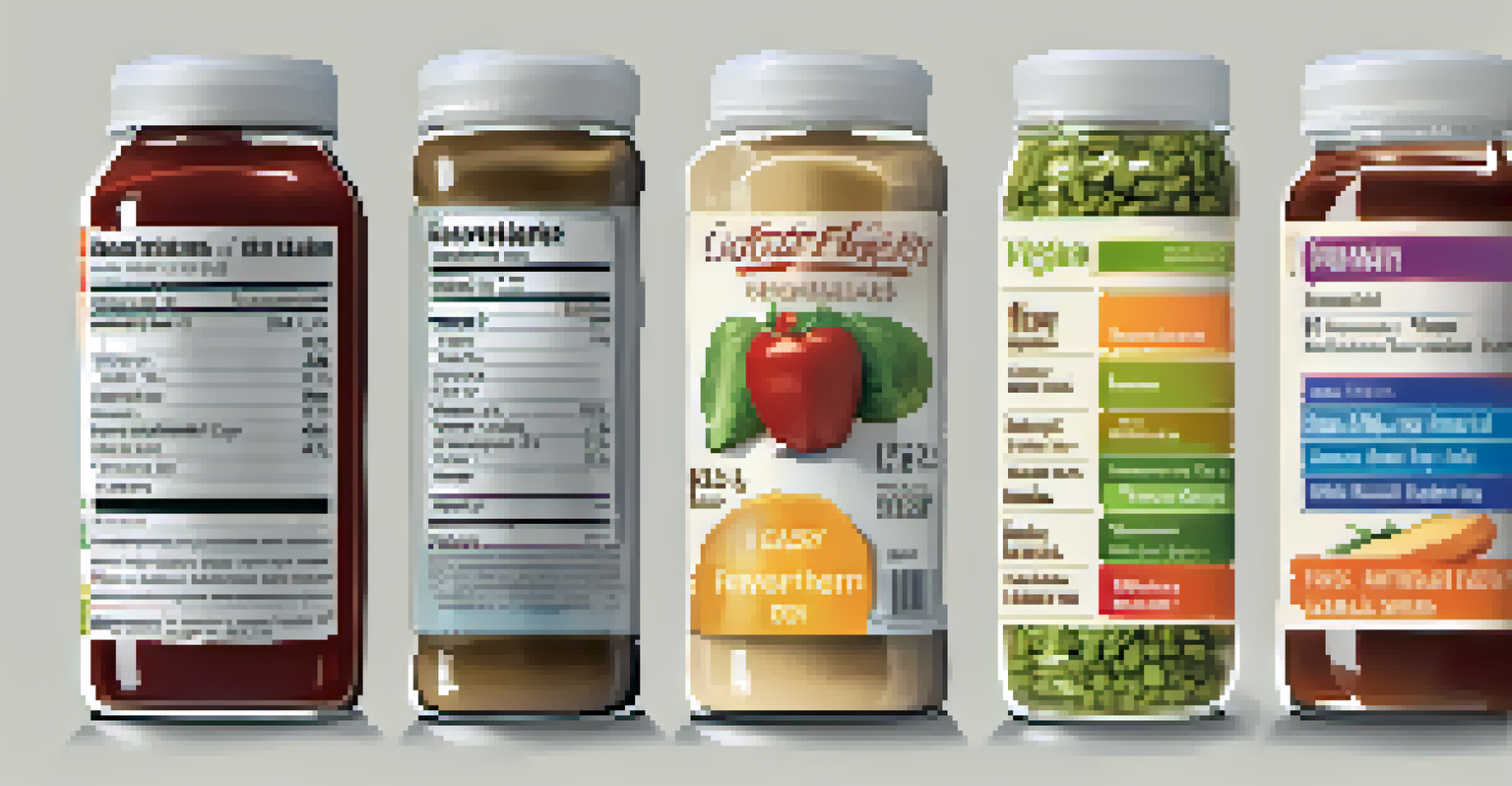Label Reading: Understanding Convenience Vegetarian Foods

Why Label Reading is Essential for Vegetarians
Understanding food labels is crucial for everyone, especially vegetarians. It helps you make informed choices about what you eat and ensures you're meeting your nutritional needs. Labels can also reveal hidden animal products that may not be immediately obvious.
You are what you eat, so don't be fast, cheap, easy, or fake.
For example, some convenience foods may contain gelatin, which is derived from animals. By reading labels carefully, you can avoid such ingredients and stick to your dietary preferences. This practice not only supports your health but also aligns with your ethical beliefs.
In a world where convenience often trumps nutrition, being label-savvy empowers you to choose products that are genuinely vegetarian. This knowledge can transform your shopping experience and ensure you're not compromising your values.
Decoding Food Labels: Key Terms to Know
Food labels can sometimes feel like a different language with terms that may confuse even the most seasoned shoppers. Key phrases like 'vegetarian,' 'vegan,' or 'plant-based' can have different meanings, so it's essential to understand them fully. For instance, 'vegetarian' might still include dairy and eggs, while 'vegan' excludes all animal products.

Additionally, terms like 'natural flavors' can be vague and may contain animal-derived ingredients. Knowing what these terms mean helps you navigate the grocery aisle with confidence. Always look for clear certifications that align with your dietary choices.
Label Reading Empowers Choices
Understanding food labels enables vegetarians to make informed dietary choices and avoid hidden animal ingredients.
Don't hesitate to do a bit of research on unfamiliar terms. A little effort in understanding these labels can save you from unexpected surprises when you get home and unpack your groceries.
The Importance of Nutritional Information
Nutritional information on labels is not just a formality; it provides vital insights into what you're consuming. Pay attention to calories, protein, fats, and fiber to ensure you're getting a balanced diet. For vegetarians, protein content is particularly important since meat alternatives can vary widely in protein levels.
Healthy eating is a way of life, so it's important to establish routines that are simple, realistically, and ultimately enjoyable.
For example, some veggie burgers may boast a high protein content, while others might be low in essential nutrients. Evaluating the nutrition facts can help you choose products that contribute positively to your health. It's all about making smart choices that fuel your body.
Remember, though, that just because a product is labeled as vegetarian doesn't automatically mean it's healthy. Always consider the nutritional profile alongside your dietary goals.
Identifying Hidden Ingredients in Foods
Many convenience vegetarian foods contain hidden ingredients that might not align with your dietary preferences. Ingredients like rennet, casein, or certain colorings can sneak into products without being immediately obvious. This is where careful label reading becomes essential.
For instance, some cheeses are made using animal-derived rennet, which vegetarians would want to avoid. By scrutinizing the ingredient list, you can identify these hidden components and make better-informed choices. A little diligence goes a long way in sticking to your vegetarian lifestyle.
Nutritional Info is Key
Reviewing nutritional information ensures vegetarians meet their dietary needs, especially regarding protein intake.
If you're ever in doubt, don’t hesitate to reach out to the manufacturer for clarification on ingredients. This not only helps you but can also encourage brands to be more transparent in their labeling.
The Role of Certifications and Labels
Certifications can simplify the label reading process by providing immediate visual cues about a product's suitability. Look for labels like 'Certified Vegan' or 'USDA Organic' to help you quickly identify acceptable options. These certifications can save time and effort when shopping.
However, it's essential to do your homework to understand what these certifications entail. Just because a product has a label does not mean it meets all your dietary needs or ethical standards. A certified vegan product still needs to align with your overall health goals.
Incorporating products with trusted certifications into your diet can enhance your convenience while maintaining your vegetarian lifestyle. Always combine these labels with your own research for the best results.
Shopping Tips for Convenience Vegetarians
When shopping for convenience vegetarian foods, having a strategy can make the process smoother. Start by making a list of trusted brands that align with your dietary choices. Familiarizing yourself with reputable companies can help you quickly identify suitable products on the shelf.
Additionally, it can be beneficial to shop the perimeter of the grocery store, where fresh produce and whole foods are typically located. Spending more time in these areas can also lead to discovering new, less processed vegetarian options. Don't shy away from exploring local markets for fresh produce and vegetarian goods.
Meal Prep Simplifies Eating
Meal prepping provides healthy, convenient vegetarian options and helps control ingredients while saving time and money.
Lastly, consider using a smartphone app that scans barcodes and provides additional information about the products you're considering. This tech-savvy approach can help you make informed decisions while on the go.
The Benefits of Meal Prep for Vegetarians
Meal prepping is a game-changer for vegetarians looking to simplify their eating habits. By preparing meals in advance, you can ensure that you have healthy, vegetarian options readily available during busy weeks. Plus, it allows you to control the ingredients and avoid processed convenience foods.
For instance, you can batch-cook grains, legumes, and veggies to create balanced meals that can be easily reheated. This not only saves time but also reduces the temptation to reach for unhealthy fast food options when you're hungry and pressed for time. Meal prep encourages creativity in the kitchen and can help you discover new favorite dishes.

Additionally, investing a little time into meal prep can lead to significant cost savings in the long run. You'll be less likely to purchase impulse items at the store, and you'll cut down on food waste by using what you buy.
Staying Informed: Continuing Your Label Reading Journey
Label reading is not just a one-time effort; it's an ongoing journey that can enhance your vegetarian lifestyle. As food products evolve and new trends emerge, staying informed will help you adapt to changes in the market. Subscribe to newsletters or follow reputable food blogs to keep up with the latest in vegetarian eating.
Engaging with communities, whether online or in-person, can also provide valuable insights and tips on label reading. Sharing experiences with fellow vegetarians can help you discover products you might not have considered. Remember, the more you learn, the better equipped you'll be to navigate the aisles.
Ultimately, being proactive about label reading allows you to enjoy the convenience of vegetarian foods while staying true to your dietary values. Embrace the learning process, and you'll find that it can be both enlightening and empowering.